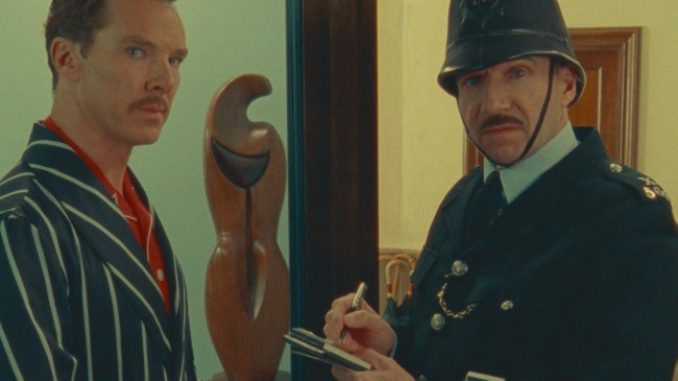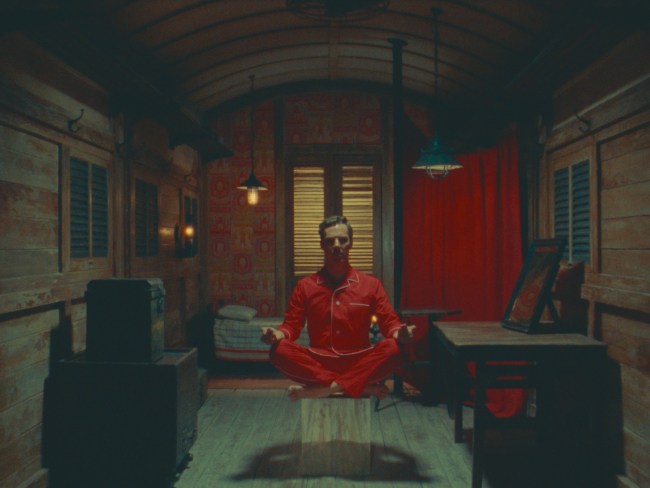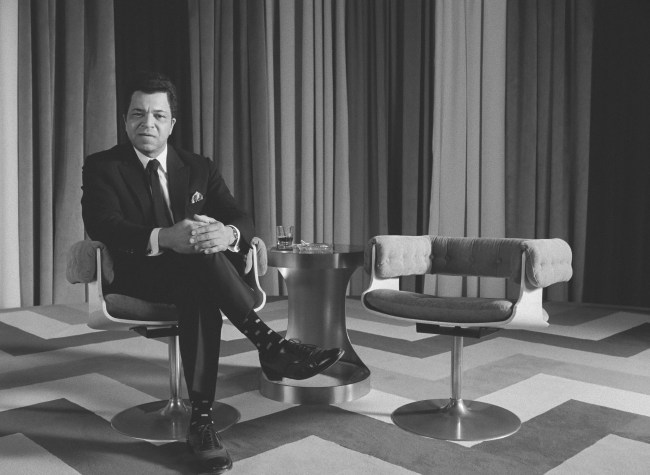
Wes Anderson is driving through the Spanish countryside with his eight-year-old daughter, Freya; it’s her school holiday. At the end of our half-hour phone conversation, he reaches Barcelona. He has always loved making shorts, clocking a dozen since his career launched with 1993 Sundance entry “Bottle Rocket,” the short that inspired his eventual debut feature of the same name, when we first met. Now, he has an Oscar frontrunner, Venice premiere “The Wonderful World of Henry Sugar,” the first and longest (39 minutes) of four increasingly strange Roald Dahl shorts (“The Swan,” “The Ratcatcher,” and “Poison” included) currently on Netflix. “Henry Sugar” is notably the highest-rated live-action short of 2023 on Letterboxd.
Netflix, which owns the screen rights to the Dahl library, provided the budget for “Henry Sugar,” and when Anderson delivered the first film economically, he had some money left over and asked for a budget to complete three more shorts. Is he done? “It’s completely up to them,” he said. “If they decide they’d like me to do some more, I’ll be eager to show up.”
From directing to producing and writing, Wes Anderson has been nominated for a total of eight Oscars throughout his career in features. Now, he’s set to win his first-ever Academy Award. While his obvious auteur imprimatur gives him an edge above the rest of his fellow Live Action Short nominees, “Henry Sugar” is beloved on its own terms. And the win is well overdue for the director of “The Grand Budapest Hotel,” whose last time in Oscar contention was as director for animated feature nominee “Isle of Dogs.” His 2023 feature, “Asteroid City,” was a hoped-for Oscar contender out of Cannes, eventually shut out of the nominees entirely. No matter, as his Netflix short should secure his long-deserved win.
In terms of shorts on any scale, he will always play with commercials and brand videos. “I’ve done lots of TV commercials, but that people let me make, like American Express,” he said. “Now and then, somebody just let me make what is totally a TV commercial, but I am allowed to create on my own rather than just being given an assignment. It is often quite fun. Sometimes I get to work with some of my own people, or work with somebody new. Like with the Prada one I had started with [cinematographer] Darius Khondji. And another one that we did with Adrien Brody for H&M in England, that was with Bruno Delbonnel, a different cameraman who’s working with me now.”
Shorts give filmmakers a chance to experiment and play, free from the commercial strictures of big Hollywood movies. Even Anderson features as wild and wacky as “The French Dispatch” or “Asteroid City” still have to be accessible enough to reach movie audiences. “When you make a short, it’s such a different experience,” said Anderson, “because you don’t have the giant weight of the duration of the production. The logistics is so much simpler. It’s such a targeted thing. Sometimes I’ve made short films that are genuinely my own thing. They’re basically for fun. Whereas when I’m making a movie movie, I’m putting my whole life into it. And it has a different gravity for me. But every now and then, I’ve done shorts where they’re totally in the same category as the feature films for me. These Roald Dahl ones are more like a movie movie for me, because it’s something I’ve been thinking about for so long.”
On the other hand, Anderson said, “I don’t think you could do a feature film quite like this. You might lose everybody. Eventually, they just say, ‘Well, is it going to actually turn into a real movie at some point?’”

With “The Wonderful World of Henry Sugar,” which deploys multiple narrators (Dev Patel, Ralph Fiennes, Ben Kingsley, and Benedict Cumberbatch), rapidly reading (including “he said”) Roald Dahl’s fantastical 1977 story about a magician (Kingsley) who learns through years of spiritual practice to see without his eyes, Anderson jumped in without knowing if his crazy concepts would work. He takes his fascination with theatrical sets and framing devices to new levels, pulling the camera through obvious fake frames into new sets. “It definitely was something quite experimental,” he said. “When we started to feel it was working, then I wanted to do some more of them.”
Ever since he was introduced to the Dahl family during the 2009 stop-motion production “Fantastic Mr. Fox,” Anderson planned to make “Henry Sugar.” Dahl’s grandson, Luke Kelly, set the story aside for the filmmaker. “It was something that I wanted to do, [but] it was on the back burner,” Anderson said. “But also I felt, ‘I’ve got to do it because he’s kept it for me for so long.’ I also loved that story when I was a kid, so I had a strong connection to the whole thing.”
Like many other creatives, lockdown provided a window for Anderson. “I focused on it,” he said, “and suddenly I thought, ‘Maybe I have an idea.’”
He took the theatrical artificial sets he’d been toying with to another level, “like they used to have on the BBC,” he said. “They would do a 45-minute or one-hour story. Stephen Frears, Alan Clark, and John Schlesinger did some. I was thinking of it in the context of around the 1980ish time. I was seeing them as theatrical but almost like a television theater-type production. But with something that seemed suitable for a short and not for a feature.”
In the most memorable sequence from “The French Dispatch,” Jeffrey Wright walks and talks through a series of sets. “It was something that I hadn’t planned to do,” said Anderson. “That came out of the fact that on the set of that movie, I realized, ‘He could do this.’ And not many people could. It was taking advantage of the luxury of having him. It was meant to be voiceover, and instead became him acting out the whole voiceover right there while he’s walking through all these spaces.”

Needless to say, Oscar-winning production designer Adam Stockhausen (“The Grand Budapest Hotel”) had to pull off the intricacies of the interlocking sets on “Henry Sugar.” He’s been part of the Anderson troupe since shooting “Darjeeling Limited” (2007) as the art director for production designer Mark Friedberg. “Anything you can throw at Adam,” said Anderson, “he’s done something more difficult already. He’s had to deal with things in every context, dealing with the laws of gravity, and water and explosions and wind and any forces that you can put to a set. With Adam, it’s him saying, ‘OK, give me a little bit of time, and I’ll come back to you.’ And I’ve never had him say, ‘We can’t find a solution for this.’ Every now and then: ‘Here’s what it’s going to cost.’”
One advantage, said Anderson, was making all the set lifting and scene-changing transparent. “We do a lot of lighting things. But anything that you see where these sets are lifting up, or sliding apart, or opening up, all of that is done in the camera, that’s happening on the set. It’s all a matter of using levers and machines, and a team of people. We have a group of stagehands who appear on camera. Well, that helps a lot. When you’ve got something that needs to happen, well, ‘Let’s bring in some of our stagehands, and they’ll help us tackle that problem.’”
They spared no expense on recreating Dahl’s Gipsy House, an exact replica of the place where Dahl used to write, from the clicking space heater to two lined-up manual typewriters and a slanted writing board. Visiting that location seeped into “Fantastic Mr. Fox,” said Anderson, as well as “The Wonderful World of Henry Sugar.”
“Having Dahl as a character in the story [Ralph Fiennes] is because he’s such a strong presence in his own work. Gipsy House is jerry-rigged in weird ways. He has one heater above him that hangs from a kind coat hanger. He had all these little objects on a table. He’s done it himself; it’s improvisational, how he’s put together that space. He’s working on some weird, self-covered board that he’s made. The whole place is like that.”
Clearly, Anderson put his faith in trained British actors, working with Cumberbatch, Patel, Kingsley, and Richard Ayoade for the first time. “What they’ve got to be able to do is to act like they’re in a play, in the theater,” he said. “So they’re doing very long takes, they’re doing lots of dialogue. They’ve got to know it enough that they can forget about it and, instead, bring it to life and make it dynamic. The cast are all picked for that. Some of these guys make it quite effortless.”
In “Henry Sugar,” Anderson enjoys messing with the viewer. In one scene, he has the narrator describe casino dealer Ben Kingsley (playing a second role in the narrative) as a “youngish man” when he clearly isn’t. “I thought that maybe we should treat the cast like a theater company,” said Anderson. “All the main people should have at least two roles in any given story. We also recast them in these other shorts. It’s saying, ‘Well, you all understand what we’re doing here. So we don’t have to pretend we’re pretending.’ In fact, the whole thing is about pretending. And if I say he’s young, you’ll accept it. You can see it’s Ben Kingsley.”
Next up: Anderson is starting “The Phoenician Scheme” in Berlin in a couple of weeks, starring Michael Cera, Benicio Del Toro, and Bill Murray, so far. And he knows he’s heading toward the theater — someday. “When we finished ‘Henry Sugar,’ I thought, ‘We could so readily adapt it to be done on stage,’” he said. “I don’t think you could do it on the stage as fast as we did it. We’d probably expand it. But I’m always afraid of the idea of doing a play because there’s no editing room. You can’t go fix it. It’s going to end, usually, when you start rehearsals. You already know the dates that you’ve got to start your previews and everything. It’s a different kind of rhythm, and it seems like crazy pressure. But it’s the way it’s done. Some time, I have to do it.”
SOURCE: IndieWire

